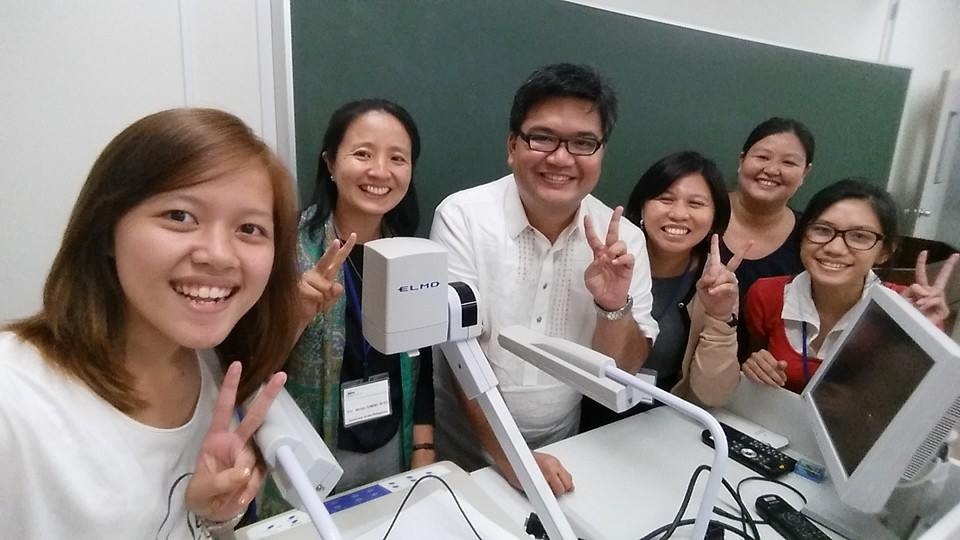Photo: Study tour participants. L–R: Michaella Azores; Michiyo Yoneno-Reyes; Angelo Arriola; Shanedey Fernandez; Farah Cunanan; and Guada Casuso. Provided by Angelo Arriola.
Students from the UP Asian Center and the UP Department of Linguistics attended an academic workshop in Kyoto and visited various sites in Osaka and Akashi City as part of a study tour in Japan from 31 July to 8 August 2015. The study tour was organized by the Asian Center and funded by the Konosuke Matsushita Memorial Foundation.
Angelo Christiane Arriola, a graduate student at the Asian Center specializing in the study of Japan, presented a paper, “The Role of the Kyoto Catholic Diocese in Providing Social Services to Filipino Migrants” at the 8th Next-Generation Global Workshop, which was held from 1 to 3 August at Kyoto University.
In his paper for the workshop, Mr. Arriola highlights the “nonreligious” role of the Catholic Church—particularly of the Kyoto Catholic Diocese and the Franciscan Sisters of the Immaculate Conception—in helping Filipino migrants integrate into Japanese society. As of 2009, there were 8,643 Filipino migrants in Japan’s ancient capital.
Using archival materials and in-depth interviews, Arriola identifies the issues that the migrants, the diocese, and nonprofit organizations face; and he shows that the Sisters from the diocese worked with the local government to provide Filipino migrants with social services such counseling and legal and health services.
The Next-Generation Global Workshop serves as an avenue for “early-career scholars” to present their research to and obtain feedback from fellow scholars from the different parts of the world. Held each year since 2007, the workshop tackles different issues and intends to “build a common academic foundation by redefining Asia in the global context.”
Carrying the theme, “Demographic Challenges in the Era of Global Ageing and Migration,” this year’s workshop sought to examine the issues—such as ageing– that arise from changing demographic patterns in Europe, North America, East Asia, and Southeast Asia. These trends have adversely affected policy making and migration to and from these regions, among others. The workshop, organized by the Kyoto University Asian Studies Unit, aims to find and generate policies for a “sustainable human society by sharing both successful and failed cases in the world.” Learn more about the Kyoto University Asian Studies Unit and the workshop.
As part of the workshop, the study tour participants also visited two offices of Kyoto City Silver Human Resources Center as well as Community-based General Care Center "Kita-ōji" and Elderly Welfare Center "Murasakino."
Joining Mr. Arriola for the study tour were fellow Asian Center student, Shanedey Fernandez; Michaella Azores and Ann Guada Casuso, students from the UP Department of Linguistics; and Farah Cunanan, Assistant Professor at the UP Department of Linguistics.
Accompanied by Dr. Michiyo Yoneno-Reyes, Associate Professor at the UP Asian Center, the study tour participants also visited the Nishijin district of Kyoto, known for its textile industry dating to premodern Japan; the Panasonic Eco Technology Center; the Akashi Great Bridge in Akashi City; the Panasonic Museum and Konosuke Matsushita Memorial Foundation, where they met Mr. Masayuki Matsushita, Vice Chair of Panasonic, President of the Foundation, and grandson of Konosuke Matsushita; the National Museum of Ethnology and the Human Rights Museum in Osaka.
The study tour was organized by the UP Asian Center and The Konosuke Matsushita Memorial Foundation. This was the second tour handled this year by the Asian Center, which obtained funding from the Japan Foundation for the study tour from 2 July to 7 July 2015.
The Asian Center offers M.A. degrees in Asian Studies with four fields of specialization: Northeast Asia, Southeast Asia, South Asia, and West Asia. The Center also has an M.A. program in Philippine Studies that allows students to major in Philippine society and culture, Philippine foreign relations, or Philippine development studies. The Center offers a Ph.D. program in Philippine Studies in conjunction with the College of Arts and Letters and the College of Social Sciences and Philosophy. Get overview of these graduate programs. The Asian Center also publishes Asian Studies: Journal of Critical Perspectives on Asia, the latest issue of which can be downloaded at the journal's website. Read other news from the Asian Center or join our mailing list to receive news and updates.


